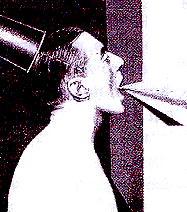In his book called The Fall of Public Man, the American writer Richard Sennett
charts the history of the modern city, a history in which cities become more
like a pump for traffic than a place to live. Sennett quotes in horror a
planner who described his local airport as a "traffic-flow-support-nexus." "For
100 years and more," writes Sennett, "we have seen that when public space
becomes a derivative of movement, it loses any independent experiential meaning
of its own. On the most physical level, these environments of pure movement
prompt people to think of the public domain as meaningless ... It is catatonic
space." The word catatonic is horribly apt as a description of the way these
great modern spaces make us feel. What is going on that they have this
effect?
 Any space, including artificial space, affects our minds and our bodies. But
artificial environments shield us from phenomena like climate, and particularly
daylight, whose cycles in the natural world expose us physically to the reality
of constant change. In an optically static environment, like most airports, the
body is physically desensitized from its sense of time.
Any space, including artificial space, affects our minds and our bodies. But
artificial environments shield us from phenomena like climate, and particularly
daylight, whose cycles in the natural world expose us physically to the reality
of constant change. In an optically static environment, like most airports, the
body is physically desensitized from its sense of time.
In a brilliant essay called The Poetics of Light, the American architect Henry
Plummer observed that "our very sense of being is based on an experience of
process, activity, and movement. We seem to find an image of our own existence
in the changing lights of the natural world." Moment-to-moment mutations of
light also provide what the philosopher Henry Bergson called "lived time," and
Ernst Cassirer "a consciousness of sequence."
All this in contrast to the so-called objective time of clocks (and departure
times at airports). A sense of time is more than an indication that you are
well-organized. Much more. According to the psychologist David Winnicott, "loss
of temporality is a feature of the psychotic and deprived individual, in which
a person loses the ability to connect the past with the present." The bridging
of the present into the past, and into the future, is, says Winnicott, a
crucial dimension of psychic integration and health.
 So there you have it. Air travel, by scrambling your mind-and-body clock,
creates the preconditions for psychosis. That's another reason it makes you
feel strange!
So there you have it. Air travel, by scrambling your mind-and-body clock,
creates the preconditions for psychosis. That's another reason it makes you
feel strange!
This will not come as dramatic news to any architects in the audience. As far
back as the 1930s, the celebrated Hawthorn Study analyzed a connection between
light and mental comfort; Hawthorn's work represents the pre-history of
environmental psychology; this has been an established branch of science for
about 15 years now. It is environmental psychologists who first coined the term
"sick building syndrome," and the development of so-called "environmentally
porous" new buildings. The smartest new structures now let fresh air and
daylight in.
The challenge posed by airports to architecture and design is threefold:
1 - contradictory operational and commercial agendas
2 - impact of artificial environments on our physical/mental state
3 - impact of cognitive disorientation, of not understanding the system,
on our mental/physical state
The contradictory agendas of airport operators is the most intractable problem
facing architects and designers. Remarkably, the architect is one of the few
people, along with the planner and the economist, who grapples materially with
the larger totality of the aviation system. Almost everyone else tends to be a
specialist in one bit of the system. But it is obvious, given these conflicting
agendas, that the chances of an architect imposing a coherent design solution
are small. I will return to the consequences of this in a moment.
The second problem - of artificial space which isolates us from natural rhythms
- can be, and is being, solved by letting in fresh air and daylight. (Indeed,
most nineteenth century parents knew the benefits of fresh air, and that
opening a child's window at night aided sleep). Increased exposure to the
elements will certainly help unscramble our sense of time when traveling, which
philosophers and psychologists agree is indeed a basic component of a healthy
human consciousness.
- 
 +
+  Any space, including artificial space, affects our minds and our bodies. But
artificial environments shield us from phenomena like climate, and particularly
daylight, whose cycles in the natural world expose us physically to the reality
of constant change. In an optically static environment, like most airports, the
body is physically desensitized from its sense of time.
Any space, including artificial space, affects our minds and our bodies. But
artificial environments shield us from phenomena like climate, and particularly
daylight, whose cycles in the natural world expose us physically to the reality
of constant change. In an optically static environment, like most airports, the
body is physically desensitized from its sense of time.
 So there you have it. Air travel, by scrambling your mind-and-body clock,
creates the preconditions for psychosis. That's another reason it makes you
feel strange!
So there you have it. Air travel, by scrambling your mind-and-body clock,
creates the preconditions for psychosis. That's another reason it makes you
feel strange!

 +
+